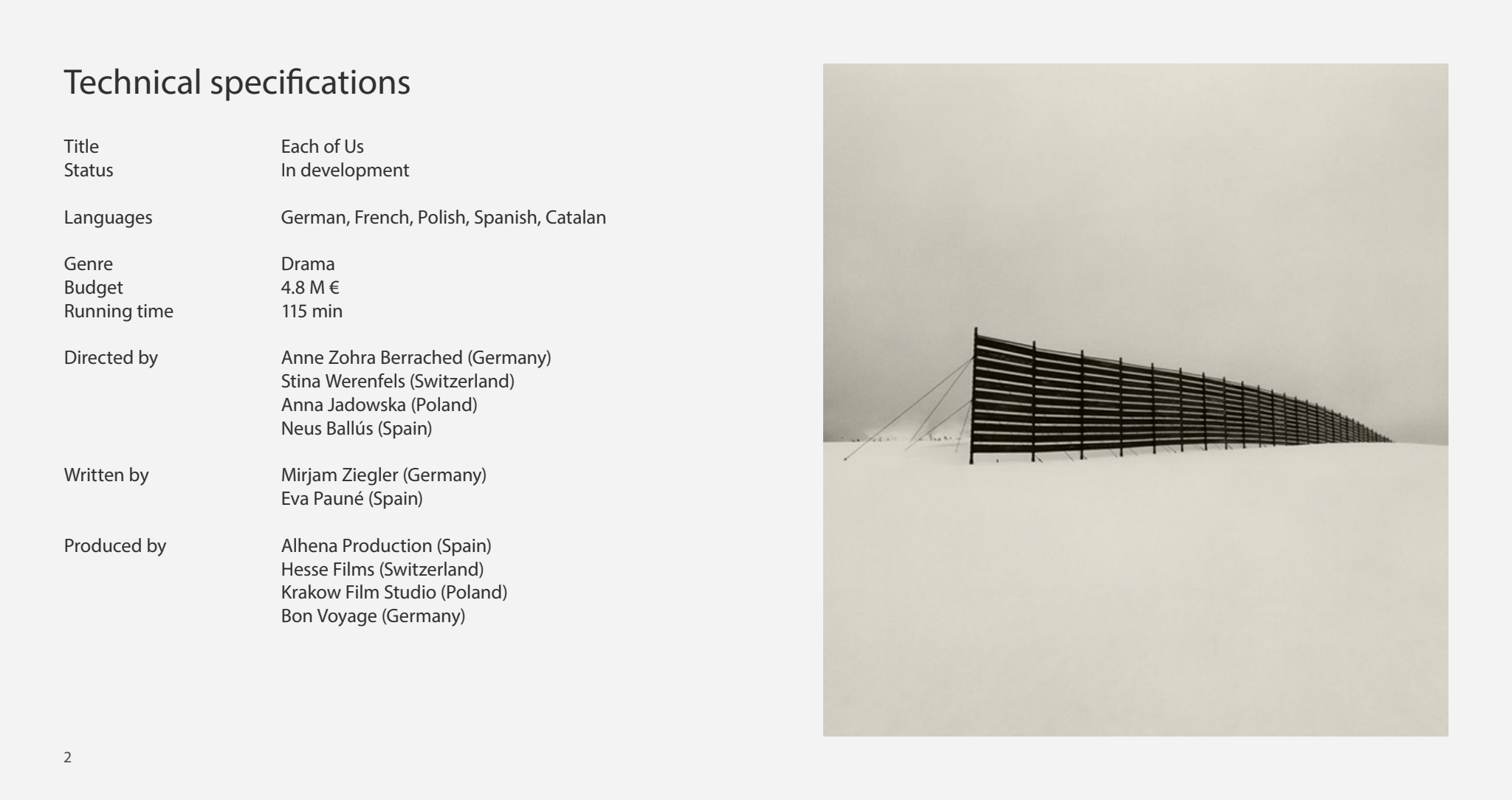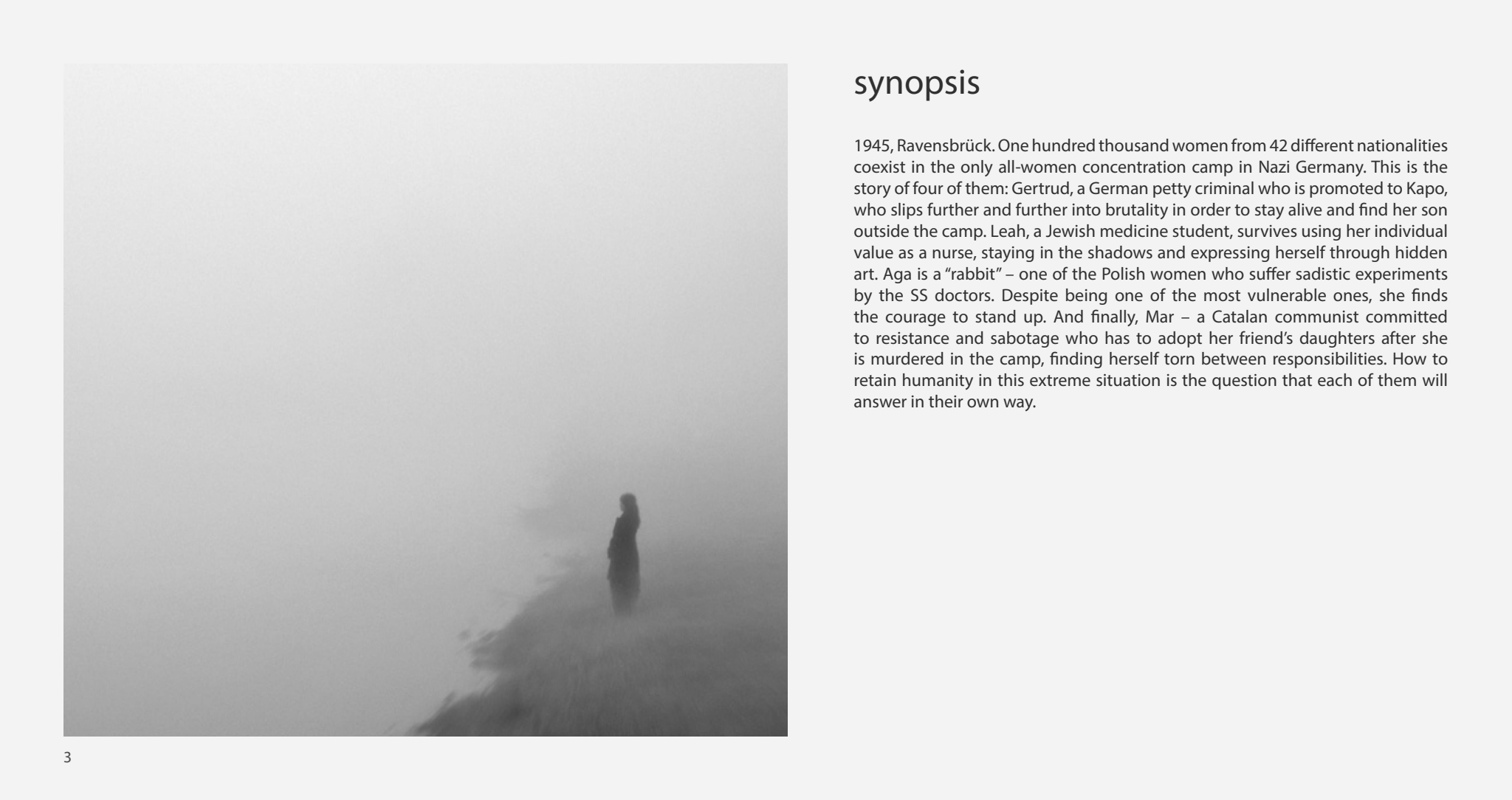In the dying days of WWII, four women must defy a system built to erase them inside the only all-female Nazi concentration camp, Ravensbrück.
Synopsis
In the final months of World War II, four women from different backgrounds struggle to survive inside Ravensbrück concentration camp—where unexpected bonds become their last hope against a dehumanizing system.
About the Directors
Neus Ballús (Mollet del Vallès, 1980) is a film director and screenwriter. Her first feature film, “La plaga” (2013), had its international premiere at the 63rd Berlinale, won four Gaudí Awards 2013 and was nominated for the 2013 Lux Awards and the European Film Awards, as well as a nomination for the Goya Awards for Best New Director. Her second feature film, “El viaje de Marta”, premiered in the Panorama section of the Berlin Film Festival and competed at the Malaga Film Festival. In 2021 she premiered “The odd-job men” at the Locarno International Film Festival, where she won the award for best male performance ex aequo for the two protagonists. The film, which vindicates the working class, was shot during a process that lasted six years. In 2022 she won three Gaudí Awards.
Born in 1982 in East Germany, Anne Zohra Berrached completed her first feature film, “Two Mothers”, during her third year of studies at the Film academy Baden-Württemberg. It premiered at the Berlinale and won the Dialogues en Perspective award of the Perspective section and later the First Steps No Fear Award. Her second feature, “24 Weeks”, premiered in Official Competition at the Berlinale in 2016. She has received 16 awards so far, including 3 Best Director Awards and the German Film Award in Silver (Lola). Her latest film “Copilot” premiered in the Panorama section at Berlinale. She has also directed numerous episodes of the “Tatort” crime series as well as the international Mini-Series “A Better Place” that was recently released on German TV.
Stina Werenfels was born in Basel (Switzerland) in 1964, but spent her childhood in the United States, Greece and Spain. After graduating in pharmacology at the Zurich Institute of Technology (ETH), she changed fields and studied film at New York University (Tisch School of the Arts). Among others, she attended masterclasses by Spike Lee, Arthur Penn and Marketa Kimbrell. Her graduation film “Fragments of the Lower East Side” received the NYU Graduate Award for Best Documentary. Back in Switzerland, she made the award-winning short film “Pastry, Pain & Politics”. Her first feature film, “Going Privat” (Nachbeben),premiered at Berlinale Panorama and won several awards, including the 2006 Swiss Film Prize. Her latest feature film, “Dora or The Sexual Neuroses of Our Parents”, was again invited to the Berlinale and won, among other awards, the Grand Jury Prize at the Festival de Films de Femmes in Créteil.
Anna Jadowska graduated from Lodz National Polish Film school and Wajda Master School of Directing. Anna’s most recent film, “Woman on the Roof”, premiered at the 2022 Tribeca Film Festival where it won Best Performance Award. Her previous feature, “Wild Roses”, received the Stockholm Impact Award 2017, and won 5 main awards at the Cottbus IFF. In 2018, she followed it up with the Award given by the Directors Guild of Poland. Prior to that, Anna directed the feature film “Touch me” (2003) which received the Grand Prix as Best Debut in Poland and was presented at the Berlinale Forum. Shortly after, her short film “Corridor” (2004) premiered at Cannes Critics Week. Recently she was recognised with 5 nominations for Eagles (Polish Oscars),for her last project “Woman on the roof”.
Artistic Statement
When we first read the testimonies of survivors, we found documented empathy and cohesion between women. They were able to overcome prejudices and build human bridges, especially under the most difficult circumstances, even if patriarchal structures have always aimed at separation and the breaking of alliances among women. We found subtle but powerful and subversive strategies of resistance, forms of courageous action. Despite different backgrounds, women found ways and means not only to survive, but tomaintain their idea of dignified coexistence by supporting, trusting and standing up for each other. Empathy is our version of “heroism”.
Regardless of whether we act from simple or difficult circumstances, empathy is not simply given, but must be developed, even earned. We think this look at recent history from the heart of Europe is worth a film.
We tell the story of four women and are four women our-selves. We believe that the perspective of each of the four directors will add another layer to the film project, making it more complex and unique. Thanks to this, the characters created by directors from the same country will become authentic and credible, and when combined with other main characters, they will give the film a universal, but also dynamic atmosphere. We have the impression that thanks to this method of work, a film will be created that, to some extent, will be able to reflect the character of the place that was Ravensbrück. After several years of working on the project, we see that collective thinking opens our stories and heroines to new possibilities and allows us to look at our own ideas from a fresh and sometimes even surprising perspective.
Year
In Production
Production Country
Spain
Production Company
Alhena Production
Subject Region
Germany
Director
Anne Zohra Berrached (Germany)
Stina Werenfels (Switzerland)
Anna Jadowska (Poland)
Neus Ballús (Spain
Producer
Alhena Production (Spain)
Turnus Film (Switzerland)
Blick Productions International (Poland)
Bon Voyage (Germany)
Writer
Mirjam Ziegler (Germany)
Eva Pauné (Spain)


